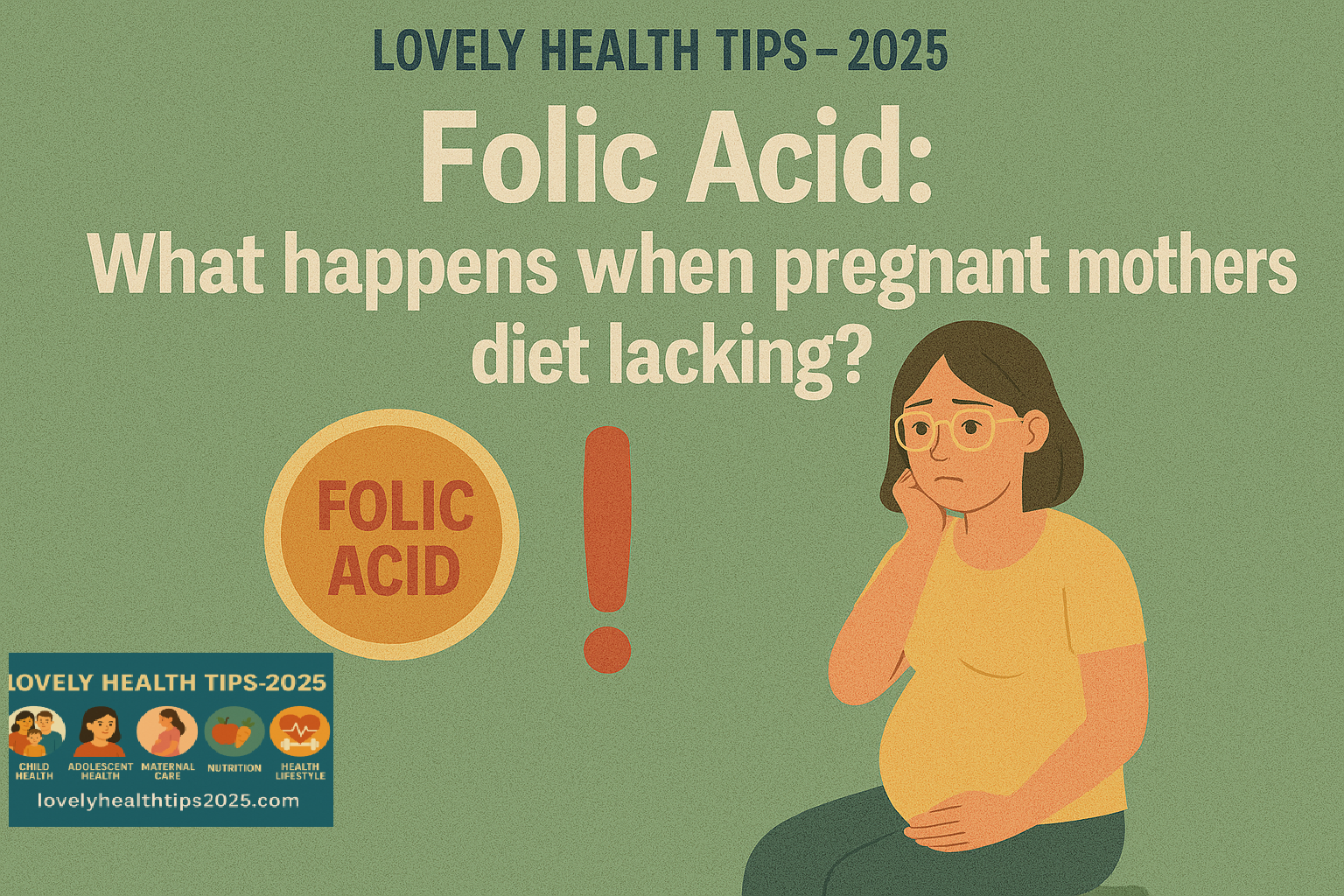Last Updated on October 21, 2025 by
A shortage of folic acid in the diet of a pregnant woman might lead to brain and spinal cord defects in her child during birth.
Consuming high-quality folic-acid, particularly three months prior to conception and during the first three months of pregnancy, protects your unborn child. 400 mcg of folic acid are needed per day.
Check whether your diet contained the following:

Folic Acid Deficiency PWs:
Introduction
If, you are a Pregnant Mother, understand the risks. Vitamin B9 exists in food and helps DNA, cell division and the development of the fetus’s nervous system.
Why should pregnant women give importance to Folic Acid?
Body requires Folic-Acid to form a placenta and for the baby to grow, so its requirement increases rapidly. It is needed for creating DNA, dividing cells and forming the neural tube in the fetus. During pregnancy. Folic-acid, or vitamin B9, is a water-soluble vitamin with risk to organs).
Risks of Folic-Acid Deficiency During Pregnancy
Maternal Complications:
- Miscarriage: Increases the chances of miscarriage and abortions.
- Higher risk of pre-eclampsia-Having insufficient amounts of folic-acid can increase the risk of pregnancy complications early. Such as pre-eclampsia (a condition where pregnant ladies develop high blood pressure).
- Megaloblastic Anemia: Megaloblastic Anemia Signs and Symptoms.
Fetal Complications:
- Neural Tube Defects (NTDs): A deficiency of folic-acid can cause grave health complications in the mother as well Fetal Complications. Reduced levels of folate in a person’s body lead to conditions such as spina bifida and anencephaly. Neural Tube Defects (NTDs) which is the riskiest in various health conditions
- Inadequate folate may result in the fetus having limited growth and lead to having low weight after being born.
- Too little folic acid in your diet may result in having a baby who comes too early (preterm).
- Developmental Delays : A pregnant woman who doesn’t get enough folic-acid also puts her child at risk for cognitive and behavioral delays.
There are several factors associated because mothers do not eat properly
- Improper Eating: Body is deficient in folate.
- Among its variety, both celiac disease and inflammatory bowel disease are responsible for poor absorption by the body through malabsorption.
- Since women require extra folic acid during pregnancy, they should take a supplement to get the needed amount.
- A diet low in folic acid may lead to the baby being delivered before full term.
How to Prevent & Manage the Folic Acid Deficiency:
A. Dietary Modifications:
Cereals, whole grains are rich folate foods. Veggies such as spinach, kale, citrus fruits, beans, lentils, as well as bread that has been fortified with folic acid. That means any foods that are fortified — such as orange juice, pasta etc.
B. Folic Acid Supplementation:
- First three months of pregnancy, Health care providers recommend that women take a 400 to 800 microgram (mcg) folic acid supplement daily from several weeks before pregnancy.
- Some drugs used against seizures can hinder folic acid absorption. If your previous pregnancy was related to the risk of neural tube defects.
C. Regular Prenatal Care:
Assess folic acid levels, the hope is that mothers receive the nutrition they require. Routine visits in addition to screening for other NTD. Risk factors will enable health care providers to tests might be performed early to check for deficiencies.
D. Awareness and educating the community through IEC/BCC.
Several Public health initiative through IEC/BCC to prevent Folic Acid deficiency, not only NTDs. If your previous pregnancy was related to the risk of neural tube defects. Additionally, make sure other problems are considered, including neural tube defects and low birth weight, among others.
Key Message :
Epidemiological surveillance of folic-acid deficiency among pregnant women is preventable condition. It may cause causes maternal or fetal morbidity & mortality. Taking folic acid from foods and using prenatal care and supplements can lower a pregnant woman’s risks of having complications. Putting these measures in place can help families avoid the problems of development. Neural tube defects and babies born with a low birth weight are among the main difficulties experienced during pregnancy. One of the first steps in promoting the health of mothers and their babies is raising awareness of the importance of folate.
FAQs:
Q1. Why there is requirement of folic acid by Pregnant women ?
Ans. Folic-Acid is required to develop brain structures & spinal cord of baby. Incipient pregnant individuals must take folic acid because it protects their developing fetus from developing neural tube defects which include spina bifida and anencephaly.
Q2. The health condition of a pregnant woman deteriorates when folic acid levels fall below recommended levels. Insufficient folic-acid intake among expectant mothers substantially raises their chances for severe birth anomalies and premature birth in addition to diminished birthweight and potential miscarriage and fetal death. The lack of folic-acid can disrupt red blood cell production in pregnant women thus causing anemia.
Q3. The medical guidelines recommend what amount of folic-acid pregnant women should take throughout pregnancy.
Ans. Health experts state that pregnant women must consume between 400 to 600 micrograms (mcg) of folic-acid starting from before pregnancy until its completion.
Q4. Folic acid content is abundant in these specific foods.
Ans. Pregnant women may benefit by eating spinach, citrus fruits, beans, fortified cereals, lentils and eggs, since they are rich in folic acid.
Q5. Does the lack of folic-acid nutrients affect how well the baby remains physically healthy after being born?
Ans. If a mother is low in folic acid, her baby may develop disabilities tied to the spinal cord and brain, plus learn at a slower rate.
Q6. Did you know that folic acid supplements become fundamental during the pregnancy period?
Ans. According to today’s healthcare advice, it’s good to take folic acid every day since eating the right amount of folic acid during early pregnancy can be very difficult.
Q7. Do pregnant women risk taking excessive levels of folic acid throughout their pregnancy?
Ans. Even if you take very high levels of folic acid, the symptoms of low Vitamin B12 might not be noticed, although it is generally safe to consume in such quantities without a medical recommendation. You must always take the amount of medicine told to you by your specialist.
Guideline of WHO for Folic Acid and its link as mentioned below: https://www.who.int/tools/elena/interventions/folate-periconceptional
Thanks and Regards.
About the Author – “Mr. Bibhu Ranjan Mund”, Master in Public Health (MPH) from IIHMR University, Jaipur (Rajasthan) has experience of 18 years in Public Health activities. Through “Lovely Health Tips-2025”, we share the evidence & experienced based health & wellness guides with solutions for every day well-being. More from Author
Disclaimer
This information is suggestive only and not a replacement for medical advice. For more detail, please visit to my website as mentioned below:

